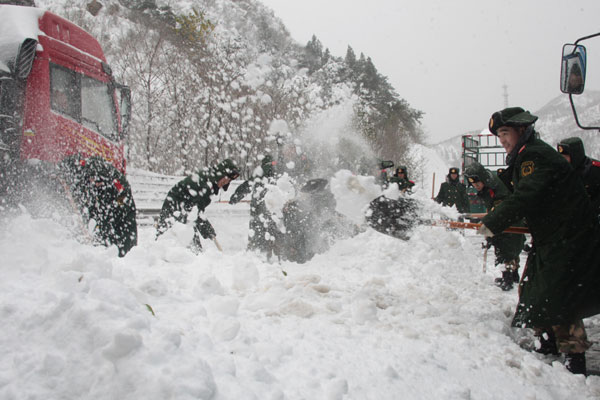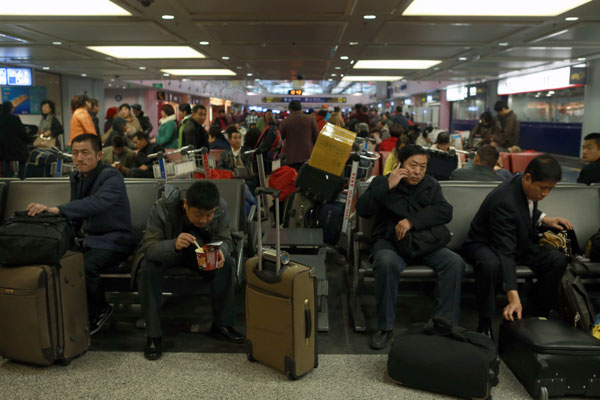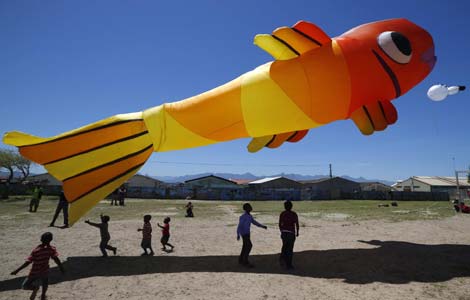Storm strands tourists at Great Wall, killing 3
Updated: 2012-11-05 07:58
By Tan Zongyang and Jin Haixing (China Daily)
|
||||||||
Many parts of North China were hit by heavy snowfall on Sunday, leaving cars stranded on highways and leading to the deaths of three tourists who were stranded overnight on the Great Wall.
According to the China Meteorological Administration, a vicious cold front was to continue hitting most parts of the capital on Sunday night, as well as the central and eastern parts of the Inner Mongolia autonomous region and northern and western parts of Hebei province.
 |
|
Police clear a section of the Beijing-Tibet Highway Sunday near the northern suburbs of Beijing before taking people to safety. The snowstorm claimed the lives of three Japanese tourists in Hebei province. [Li Guangyin/China Daily] More photos |
The weather earlier in the day and the previous night had turned deadly for one group of tourists.
Four Japanese travelers and one Chinese were trapped at an unrestored section of the Great Wall in Hebei's Huailai county on Saturday night, China News Service reported, quoting sources in the county's publicity bureau. A guide who was with the group left to get help, and three of the Japanese tourists died.
The two survivors were in a hospital on Sunday night and were in stable condition, Huailai authorities said.
In Beijing, the city's downtown was not greatly affected by the snow, but many of its expressways that connect it to other places were congested.
Badaling Expressway, a busy artery that runs toward Beijing's northwest, was closed for more than three hours on Sunday morning because of snow, the Beijing Municipal Transport Commission said.
About 1,000 vehicles were stuck on the road. In some places, the snow was 80 cm deep, Xinhua News Agency reported.
 |
|
Passengers are stranded at the Beijing Capital International Airport amid a snowstorm on Sunday. Feng Yongbin / China Daily |
The same day, authorities raised a weather alert from blue to orange, indicating the second-most severe conditions in the four-level system. The alert remained at that level until 6 pm.
Hebei province has released a regional red alert, forecasting snow in the cities of Zhangjiakou, Chengde and Baoding from late Sunday night to Monday.
Rain, sleet and snow have been forecast until Tuesday in most parts of North China, as well as regions along the Yellow and Huaihe rivers, and some parts of Northeast China, according to the China Meteorological Administration.
On Sunday, Beijing's meteorological center also issued a red alert for certain parts of the city, warning residents to beware of a snowstorm and icy roads.
The capital saw its first winter snow late on Saturday. By 11 am Sunday, 56.6 mm of precipitation had fallen, said Sun Jisong, chief forecaster at the Beijing Municipal Meteorological Center.
In Haidian district's Fenghuangling area, as much as 96 mm fell over a period of about 40 hours.
From Saturday until Sunday, the Beijing Municipal Meteorological Center sent out more than 30 million warning messages about the weather to the public.
Sun said the rain and snow were expected to end late on Sunday.
Transport links throughout the capital and surrounding areas were affected by the bad weather.
A spokesman for Beijing Capital International Airport said that, by 11:30 am on Sunday, 23 flights had been canceled and another five flights had been delayed by more than an hour. Flight schedules had returned to normal by 2 pm.
"We've been preparing for the work of de-icing the aircraft and the runway," said Qu Dong, a duty manager in the airport's operation control center. "The good news is the snow is not as heavy as expected, so it has not resulted in a large amount of flight delays."
In airport terminals, flight information has been broadcast around the clock, while bottled water, blankets and other supplies have been provided to stranded passengers, he said.
Qu said the airport will pay close attention to forecasts, which were calling for the weather to improve by Monday night.
Traffic authorities took temporary measures on several expressways that were severely covered by snow or rainwater, or roads with slippery surfaces.
Parts of the above-ground tracks used by trains on Line 13 of the Beijing subway system were blocked on Sunday by tree branches blown down by strong winds.
After four hours of emergency repairs, the fallen trees were removed from the line and trains began to run again, Beijing Subway Operation said.
The company also said emergency measures had been carried out in response to the snow since Saturday night. Nearly 4,000 kg of snow-melting agent have been used to get rid of the snow and ice.
Non-slip mats and caution signs have been installed at subway station entrances, and free plastic raincoats have been handed out to passengers, the company said.











